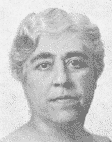Caterina Albert i Paridis (1869-1966) “Victor Catala”

Works:
Tales
Drames rurals – 1902
Ombrívoles – 1904
Caires vius – 1907
La Mare-Balena – 1920
Vida molta – 1949
Jubileu – 1951
Monologues
La infanticida – 1898
El llibre nou – 1898
Fiction
El llibre blanc – 1905
Marines – 1928
Contrallums – 1930
Novel
Solitud – 1905
Un film (300 metres) – 1926
Poesy
El cant dels mesos – 1901
Llibre Blanc – Policromi – Tríptic – 1905
Theater
Quatre monòlegs – 1902
Teatre inèdit (published in 1967)
Miscellaneous
De civisme i civilitat – 1917
Sensacions d’Empúries – 1923
Mosaic – 1946
Life:
Born in l’Escala (Alt Empordà) in the year 1869 into a family of rural owners.
Her cultural education, basically self-taught, was oriented to the artistic aspects she preferred, specially the literature and the painting.
Caterina Albert started to publish some writings in the magazine “l’Esquella de la Torratxa” with the pseudonymous Virgili Alacseal at a very young age.
Her works are influenced by the literary movements of her youngness: the Modernisme (Art Nouveau) in its first period, with works as Solitud (1905) – a capital work of the Catalan literary Art Nouveau – and at the end of her life, the naturalism.
As a result of the scandal of her writing “La infanticida” (The infanticide) presented to the Floral Games of Olot in 1898, in which he shown an analysis of the a woman exploited by a primitive and rural society, he adopted the pseudonym of Víctor Català.
The theatre was one of the big passions of Caterina Albert, instead of this is one of her more unknown aspects. Her works are regrouped in “Quatre monòlegs” (1902) and Teatre inèdit (1967).
Her poetic works are, as her theatre, not very much known, and is basically composed of tragic monologs with romantic influences.
Her works in prose are recognized as ones of most importants in Catalan language. In addition of “Solitud”, other works are “Drames rurals” (1902), “Ombrívoles” (1904) and “Caires vius” (1907).
From 1917, her works take a new orientation to the naturalism with texts as the novel “Un film (300 metres)” (1926) and other writings as “Contrallums” (1930) and “Jubileu” (1951) who is the last one.
The most common aspects of the Caterina Albert works are developed in rural ambiances with cruel people dominated by fatalism. This tendency is broken at the end of her work, specially in “Jubileu”, developed into a city (Barcelona) shown more refined ambiences and the nostalgia of other times.
Caterina Albert died in her native town in the year 1966.
|
Specific
|
|||
| Title | Author | Published by | Year |
| Caterina Albert / Víctor Català. La voluptuositat de l’escriptura | Bartrina, Francesca | Eumo Editorial – Col·lecció Capsa de Pandora | 2001 |
| Obres completes: Els silencis de Caterina Albert | Capmany, Mª Aurèlia | 1972 | |
| La condició de la dona en la narrativa catalana femenina | Charlon, Anne | Edicions 62 – Col·lecció Llibres a l’abast | 1990 |
| Lettura di Solitud | Gavagnin, Gabriella | AISC, Biblioteca Catalana | 1987 |
| Gran enciclopèdia catalana | Diferents autors | Enciclopèdia Catalana | |
| La prosa modernista: un concepte polièdric | Julià, Lluïsa | Lletra – UOC – Espai virtual de literatura catalana | |
| Aspectes del Modernisme | Marfany, Joan Lluís | Curial | 1975 |
| Caterina Albert i Paradís “Víctor Català” | Miracle, Josep | Editorial Dopesa | 1978 |
| Historia de la Literatura catalana, El Modernisme, vol 8. | Molas, Joaquim / de Riquer, Martí | Editorial Ariel | 1985 |
| Introducció a Solitud | Nardi, Núria | Edicions 62 | 1990 |
| Historia de la literatura catalana, “Víctor Català”, vol 4. | Nardi, Núria | Edicions 62 / Orbis | 1984 |
| Biografia de Víctor Català | Oller i Rabassa, Joan | Rafael Dalmau editor | 1967 |
| Dotze mestres | Serrahima, Maurici | Destino | 1972 |
| El primer modernismo literario catalán y sus fundamentos ideológicos | Valentí, Eduard | Editorial Ariel | 1972 |
Other Catalan Art Nouveau Writers:
Caterina Albert i Paradís Prudenci Bertrana Jaume Brossa i Roger Raimon Casellas i Dou Ignasi Iglesias i Pujades Pompeu Gener Adrià Gual i Queralt Hortensi Güell Antoni Isern Albert Llanas Joan Maragall i Gorina Alfons Maseras i Galtés Jaume Massó i Torrents Apel·les Mestres i Oñós
Rafael Nogueras i Ollé Miquel de Palol Josep Pin i Soler Josep Pons i Pagès Pere Prat i Gaballí Joan Puig i Ferrater Alexandre Riquer i Ynglada Santiago Rusiñol i Prats Joaquim Ruyra i Oms Maria Antònia Salvà Víctor Català (see Caterina Albert)
Plàcid Vidal i Rosich Jeroni Zanné i Rodríguez
